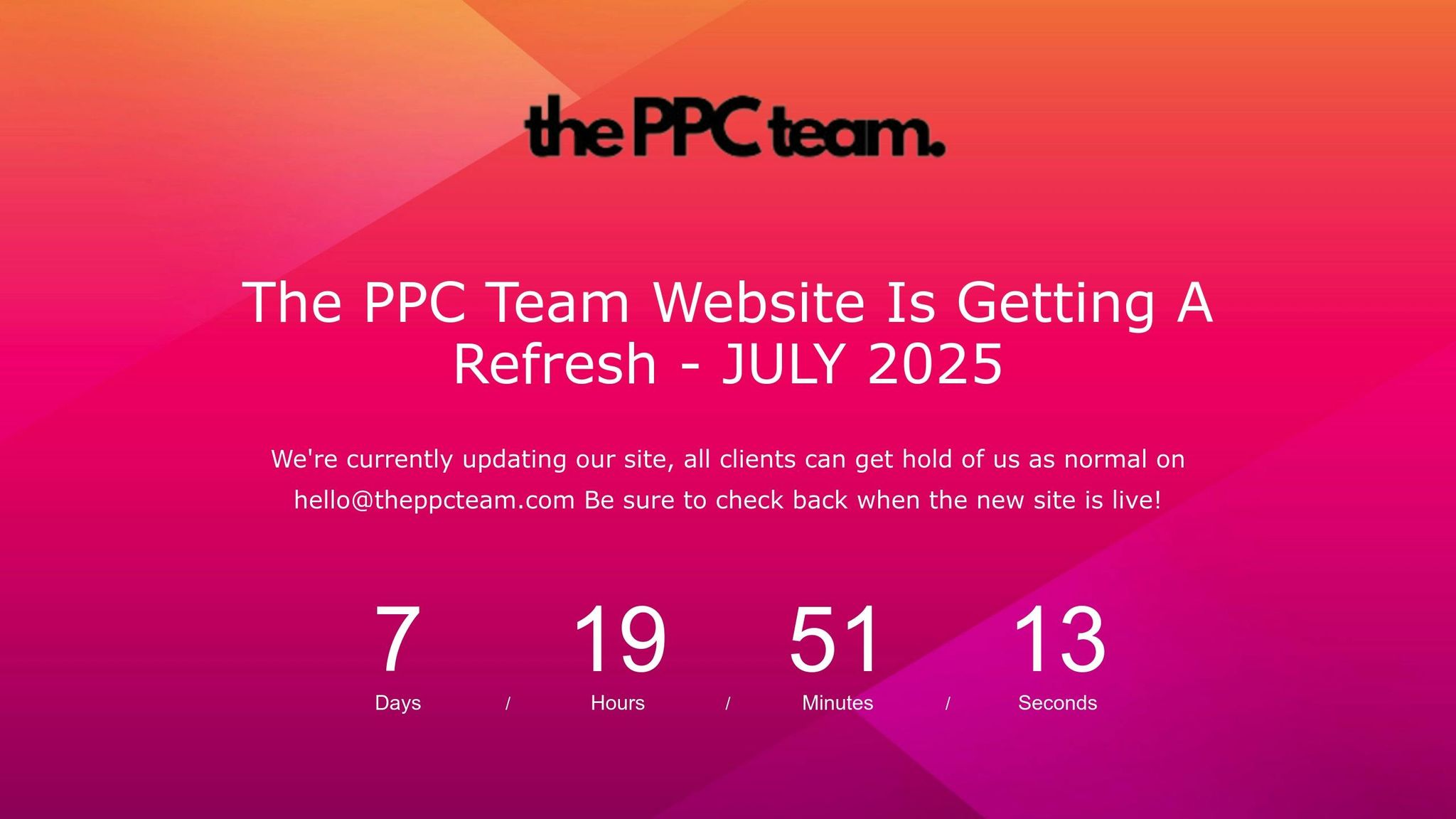How Competitor Benchmarking Improves PPC ROI
Competitor benchmarking in PPC (Pay-Per-Click) advertising helps you understand your competitors’ strategies, enabling smarter decisions for better ROI. By analysing metrics like impression share, CTR, CPC, and conversion rates, you can refine your campaigns, improve ad performance, and reduce costs. Tools like Google Ads Auction Insights, SEMrush, and SpyFu simplify this process, while tailored services, like those from The PPC Team, offer deeper insights for UK businesses.
Key takeaways:
- Metrics to track: Impression share, CTR, CPC, Quality Score, and landing page performance.
- Tools to use: Google Ads Auction Insights, SEMrush (£119/month), SpyFu (£39/month), and Facebook Ad Library (free).
- Benefits: Better keyword targeting, improved ad copy, and optimised landing pages for higher conversions.
- UK-specific strategies: Consider seasonal trends, regional targeting, and compliance with local regulations.
Competitor benchmarking isn’t optional anymore – it’s essential for staying ahead in the UK’s competitive digital landscape.
How To Run A Competitor Analysis For PPC
1. Standard Competitor Benchmarking Methods
To maximise ROI, competitor benchmarking requires a structured approach that turns data into actionable strategies.
PPC Metrics Analysed
Tracking the right metrics is the backbone of effective benchmarking. For instance, impression share shows how often your ads are seen compared to competitors, while top impression rate and outranking share indicate how well your ads perform in search rankings.
Other essential metrics include CTR (click-through rate), CPC (cost-per-click), and conversion rates, which provide a clearer picture of your competitors’ performance. For context, the average CPC for B2B Google Ads is around £2.70.
Quality Score analysis is particularly revealing. Competitors with higher Quality Scores often secure better ad placements at lower costs, making this metric a key factor for improving cost efficiency and visibility.
Landing page performance also plays a crucial role. By examining competitors’ bounce rates, average time on page, and conversion funnel data, you can identify areas where they excel in guiding customers through the buying journey.
Tools and Techniques Used
Several tools can streamline competitor benchmarking:
- Google Ads Auction Insights: Provides real-time comparisons of impression share, overlap, and position above rates.
- SEMrush: Starting at £119 per month, this tool delivers insights into competitor keywords, estimated traffic, and likely CPCs. Stuart Pereira from WSI Comandix highlights its value:
"Our favourite tool for PPC competitor analysis is Semrush. It gives access to competitor PPC keywords, estimated traffic amounts, likely CPCs, etc. Also, for active search campaigns, Auction Insights in Google Ads is key to knowing how your campaigns are faring vs. your competition."
- SpyFu: Starting at £39 per month, it focuses on competitor research for Google Ads.
- PPC.io: An AI-powered tool offering competitor audits and strategy recommendations, with plans starting from £0 (with credits) and £79+ monthly.
- Facebook Ad Library: A free resource for analysing competitors’ social media ad strategies, which complements search campaign insights.
These tools not only provide a clear view of the competition but also help identify opportunities for improving ROI.
Impact on ROI
Competitor benchmarking directly impacts ROI by guiding smarter decisions on bids, keywords, and landing pages.
- Bid optimisation: Understanding competitor bid patterns allows you to time your bids for maximum efficiency.
- Keyword gap analysis: Identifying keywords your competitors overlook can lead to cost-effective traffic acquisition.
- Ad copy insights: Analysing competitors’ messaging and calls-to-action can improve your CTR, which in turn enhances your Quality Score and reduces costs.
- Landing page improvements: Using frameworks like AIDA to study competitor landing pages can highlight changes to increase conversion rates.
Customisation for UK Businesses
The UK market presents unique challenges and opportunities, requiring a tailored approach to benchmarking. Around 70% of UK organisations use benchmarking to identify gaps, a critical practice in sectors worth £200 billion.
British consumer behaviour often follows distinct seasonal trends. Events like January sales, summer holidays, and Christmas demand competitor analysis that accounts for these local patterns.
Regional targeting can also reveal untapped potential. For example, while a competitor may focus heavily on London, cities like Manchester, Birmingham, or Edinburgh might offer opportunities for growth.
Finally, the UK’s regulatory environment shapes how PPC campaigns are run. Understanding how competitors handle advertising standards and data protection requirements can help you stay compliant while maintaining a strong competitive edge.
Adapting these benchmarking methods to the UK market ensures that competitor insights translate into tangible ROI improvements.
2. The PPC Team‘s Competitor Analysis Services

The PPC Team takes a refined approach to competitor analysis, going beyond standard benchmarking techniques. By combining analytics with a deep understanding of the UK market, they focus on improving ROI and delivering measurable outcomes for businesses.
PPC Metrics Analysed
The PPC Team zeroes in on key metrics that drive ROI, such as impression share, top-of-page rate, and outranking share. These metrics form the foundation for evaluating competitive positioning. Their strategy also includes analysing ad scheduling to pinpoint peak bidding and conversion times, ensuring budgets are allocated more effectively. Additionally, keyword gap analysis uncovers untapped traffic opportunities, while reviews of landing pages highlight user experience strengths like faster load times and exclusive offers.
Tools and Techniques Used
Blending automated tools with expert insights, The PPC Team continuously tracks competitor activity. Their methodology includes regular checks of the Auction Insights tab in Google Ads, setting up automated alerts to fine-tune bidding strategies, and using labels in bidding tools to monitor top-performing keywords. Claire Aldridge, Digital Marketing Specialist at Victory Digital, highlights the value of these tools:
"Having these tools at our disposal means we can offer our clients a deeper analysis of their PPC account. By being able to carry out more in-depth competitor analysis, spanning more than just the auction, we can provide better decision-making and recommendations that more accurately reflect the market."
This combination of tools and expertise ensures campaigns are optimised for profitability.
Impact on ROI
The PPC Team’s competitor analysis directly boosts ROI by refining strategic positioning and improving messaging. By studying competitors’ ad copy, they help clients identify which pain points and benefits are being emphasised, enabling them to sharpen their own value propositions. Alyssa Galik, Lead Strategist at HawkSEM, explains:
"By analysing competitors’ ad copy, you understand what pain points or benefits they are highlighting. This helps you define how you want to position yourself and what value proposition you can outshine your competitors on."
The team also examines competitors’ conversion strategies, including calls-to-action, lead generation methods, and overall user experience. By keeping a close eye on market trends and shifts, they ensure clients remain ahead, even as the average cost per click has increased by 12.88% year-over-year.
Customisation for UK Businesses
Specialising in white-label PPC management, The PPC Team tailors its competitor analysis services to meet the specific needs of small and medium-sized UK businesses. With expertise spanning industries such as fashion, SaaS, iGaming, finance, charities, and retail, their strategies align with local market trends. By leveraging advanced automation and AI-driven tools, they provide comprehensive solutions across platforms like Google Ads, Microsoft Ads, and Facebook/Instagram Ads. This approach helps UK businesses stay competitive and achieve sustainable growth.
sbb-itb-dcae4ad
Advantages and Disadvantages
Building on the benchmarking methods described earlier, the table below compares standard approaches with The PPC Team’s specialised strategy. Each method has its own strengths and limitations, which can significantly impact campaign performance.
| Aspect | Standard Benchmarking Methods | The PPC Team’s Approach |
|---|---|---|
| Metrics Analysed | Basic metrics like impression share, overlap rate, and position above rate from Google Ads Auction Insights | Advanced metrics including top-of-page rate, outranking share, keyword gap analysis, and landing page performance |
| Tools Used | Free tools such as Google Keyword Planner and paid options like Semrush (£99/month) and SpyFu (£30/month) | Automated alerts, bidding tool labels, and continuous competitor tracking supported by expert analysis |
| ROI Impact | Highlights keyword opportunities and basic competitive positioning | Improves ROI through precise targeting, refined messaging, and higher conversion rates |
| UK Business Suitability | Generic approach requiring in-house expertise and tool management | Tailored solutions for SMEs in industries like fashion, SaaS, iGaming, finance, charities, and retail |
This comparison shows how enhanced monitoring and expert insights can address the gaps in standard methods. The PPC Team’s customised approach is particularly well-suited for maximising PPC ROI in the UK market.
Standard Methods: Strengths and Weaknesses
One of the main advantages of standard methods is their cost-effectiveness, especially for businesses with existing PPC expertise. Tools like Semrush provide in-depth competitor ad copy analysis, while SpyFu offers budget estimates that aid in strategic planning. On average, businesses see a £2 return for every £1 spent on PPC.
However, these methods come with challenges. Managing multiple tools and interpreting data require significant expertise, which can be a barrier for smaller businesses. Additionally, with the average cost per click rising by 12.88% year-over-year, errors in competitor analysis can become costly. Alyssa Galik, a lead strategist at HawkSEM, highlights the importance of ongoing competitor analysis:
"Competitor analysis provides a visual of the PPC landscape before you enter it. It helps you understand how your strategy is working and where you may have gaps. Looking at the data on an ongoing basis provides information on position, budgets, copy, and opportunity." – Alyssa Galik, HawkSEM Lead Strategist and PPC expert
The PPC Team’s Approach: Key Benefits
The PPC Team’s methodology stands out by combining automated tools with expert interpretation. This ensures businesses stay ahead of market changes and don’t overlook critical trends. Their focus extends beyond keywords to include conversion processes and user experience. Alyssa Galik explains this approach further:
"It is critical to review competitors’ landing pages and conversion processes. Observe the CTAs they use, how they generate leads, and what user experience they provide. Each of those pieces can help you develop a stronger PPC strategy than your competitors." – Alyssa Galik, HawkSEM Lead Strategist and PPC expert
While professional services may involve higher upfront costs and less direct daily control, they often deliver better results for businesses without dedicated PPC expertise. The continuous monitoring and specialised knowledge provided by The PPC Team can outweigh these initial concerns.
Ultimately, the best approach depends on your business’s internal resources and priorities. Companies with in-house PPC teams might benefit from blending standard tools with professional insights, whereas smaller businesses often achieve greater success with fully managed services that simplify tool management and data interpretation.
Conclusion
Competitor benchmarking has become a game-changer for UK businesses aiming to maximise their PPC returns. Recent data highlights how this strategy can significantly boost PPC performance when done effectively.
Without analysing competitors, businesses risk making decisions based solely on their own data, missing out on critical market insights. Amanda Pell from WhatConverts puts it perfectly:
"Without competitive analysis, you’re essentially advertising in the dark, making decisions based on your own data while missing crucial market context".
Considering that the top three paid ads account for nearly 50% of all clicks, competitive analysis is no longer optional – it’s essential.
For UK businesses, the key to improving PPC performance lies in systematically tracking competitor activity. This includes monitoring competitor keywords, ad copy, and landing pages to uncover opportunities and address campaign weaknesses. To get started, focus on these three steps:
- Identify keywords your competitors are targeting.
- Examine their landing pages to understand their conversion techniques.
- Compare your campaign performance against industry benchmarks.
The impact of this approach is clear. For example, Salience helped Crisis achieve a 20% increase in clicks, a 61% boost in revenue, and a staggering 493% return on ad spend through detailed PPC analysis.
With 62% of brands increasing their PPC budgets, the competition is fiercer than ever. Competitor benchmarking isn’t just a smart move – it’s a necessity. Businesses that adopt this strategy will be better equipped to optimise their ad spend, capture more market share, and thrive in the UK’s competitive digital landscape.
FAQs
How can competitor benchmarking help UK businesses improve their PPC ROI?
Competitor benchmarking offers a powerful way for UK businesses to boost their PPC ROI by digging into the strategies of their rivals. By examining elements like keyword selection, ad placements, and bidding trends, companies can pinpoint areas where they can improve and uncover opportunities they might have missed.
This approach allows businesses to fine-tune their targeting, allocate budgets more efficiently, and craft smarter bidding strategies. The result? Better returns on investment. By relying on data to guide decisions, UK businesses can not only keep up with the competition but also make their PPC campaigns work harder and deliver more impactful results.
What are the best tools for competitor benchmarking in PPC, and how do they compare?
Competitor benchmarking in PPC becomes much simpler with tools like SEMrush, SpyFu, Google Ads Auction Insights, and the Facebook Ad Library. Here’s what each brings to the table:
- SEMrush: Dive deep into competitors’ keywords, ad strategies, and even get estimates on their budgets. It’s a great all-rounder for understanding how others are operating.
- SpyFu: This tool excels at revealing competitors’ bidding tactics and identifying their top-performing keywords.
- Google Ads Auction Insights: Get real-time data on how your ads stack up against competitors during the same auctions.
- Facebook Ad Library: Perfect for social media, it lets you see and analyse active ads from competitors.
Each tool has its strengths, from the level of detail they provide to the platforms they support. Picking the right one for your needs can help you fine-tune your campaigns and make the most of your advertising spend.
How can UK businesses optimise their PPC strategies for local market trends and regulations?
To fine-tune PPC strategies for the UK market, businesses need to focus on crafting localised ad copy that incorporates British spelling, reflects regional preferences, and resonates with local sensibilities. Paying attention to these details ensures the messaging feels authentic and relatable to a UK audience. Additionally, using hyper-local targeting allows brands to connect with specific demographics effectively, making campaigns more precise and impactful.
It’s also crucial to stay on the right side of UK data protection laws, such as GDPR. This not only helps businesses avoid hefty penalties but also builds trust with consumers, which can be a key differentiator in a competitive market.
Keeping an eye on emerging digital trends, like AI-powered tools and voice search, is equally important. These advancements are reshaping how consumers interact with ads and make purchasing decisions. By adapting to these shifts and aligning campaigns with UK-specific regulations and market patterns, businesses can achieve better ROI and deliver stronger campaign results.

